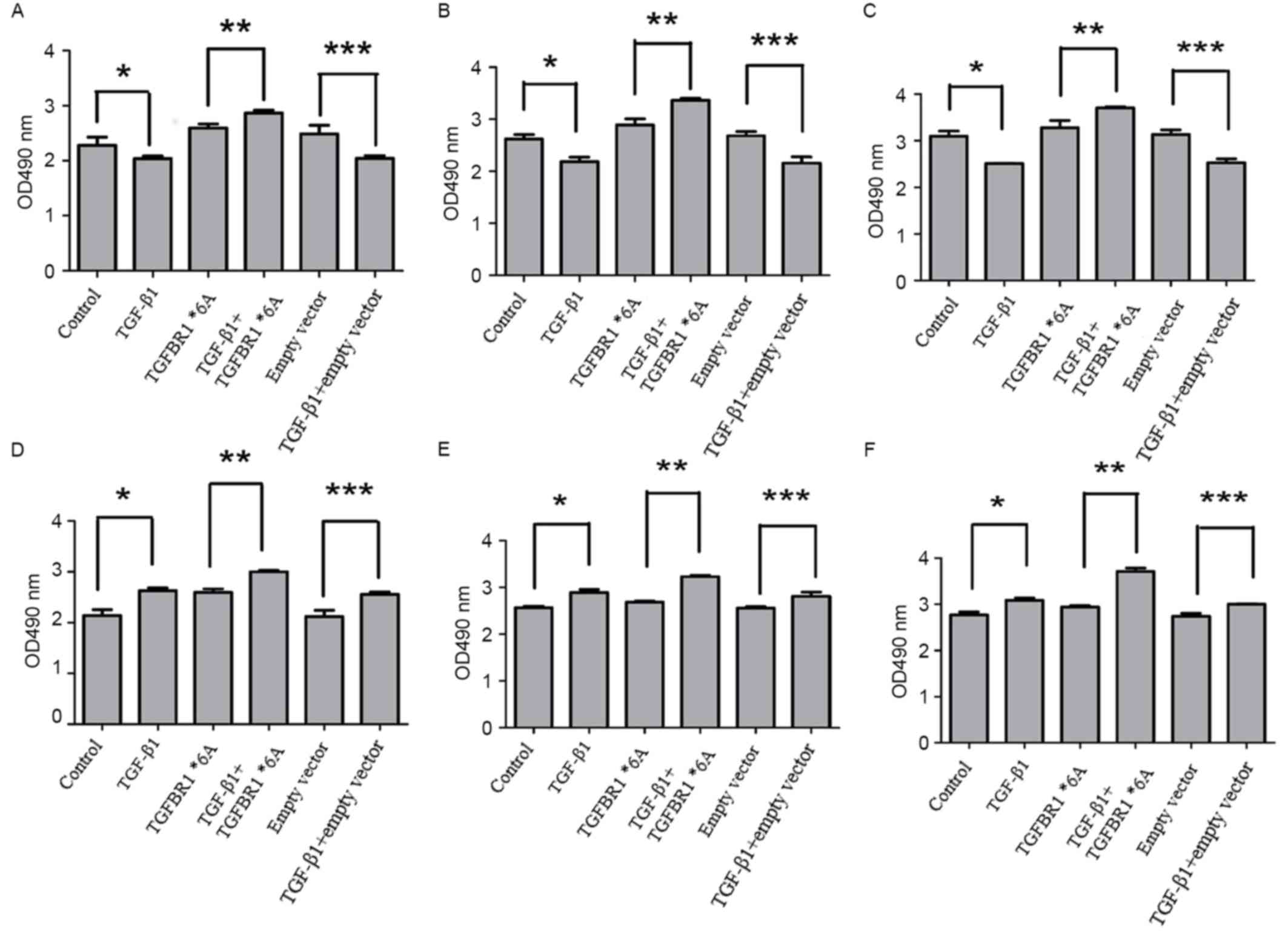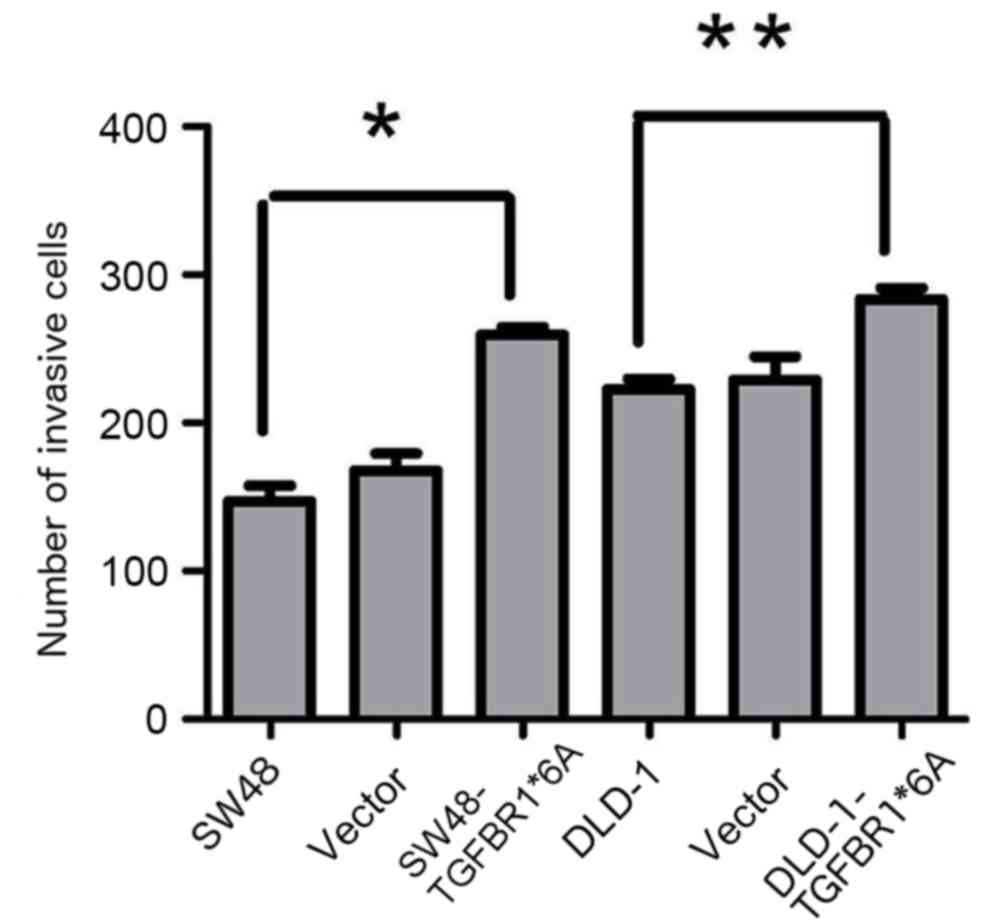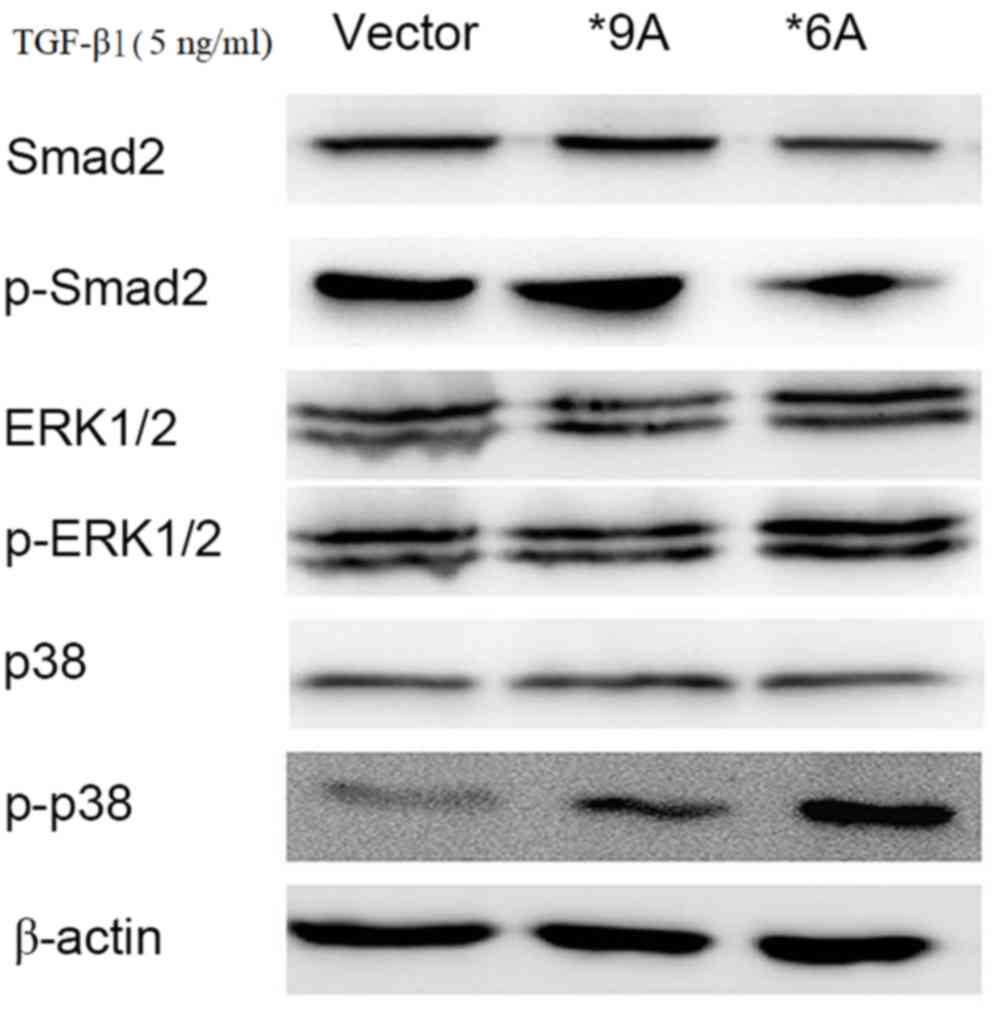|
1
|
David CJ, Huang YH, Chen M, Su J, Zou Y,
Bardeesy N, Iacobuzio-Donahue CA and Massagué J: TGF-β tumor
suppression through a lethal EMT. Cell. 164:1015–1030. 2016.
View Article : Google Scholar : PubMed/NCBI
|
|
2
|
Principe DR, Doll JA, Bauer J, Jung B,
Munshi HG, Bartholin L, Pasche B, Lee C and Grippo PJ: TGF-β:
Duality of function between tumor prevention and carcinogenesis. J
Natl Cancer Inst. 106:djt3692014. View Article : Google Scholar : PubMed/NCBI
|
|
3
|
Mehrvarz Sarshekeh A, Advani S, Overman
MJ, Manyam G, Kee BK, Fogelman DR, Dasari A, Raghav K, Vilar E,
Manuel S, et al: Association of SMAD4 mutation with patient
demographics, tumor characteristics and clinical outcomes in
colorectal cancer. PLoS One. 12:e01733452017. View Article : Google Scholar : PubMed/NCBI
|
|
4
|
Ramamoorthi G and Sivalingam N: Molecular
mechanism of TGF-β signaling pathway in colon carcinogenesis and
status of curcumin as chemopreventive strategy. Tumour Biol.
35:7295–7305. 2014. View Article : Google Scholar : PubMed/NCBI
|
|
5
|
PLOS ONE Staff: Correction: Association of
SMAD4 mutation with patient demographics, tumor characteristics and
clinical outcomes in colorectal cancer. PLoS One. 12:e01782752017.
View Article : Google Scholar : PubMed/NCBI
|
|
6
|
Fleming NI, Jorissen RN, Mouradov D,
Christie M, Sakthianandeswaren A, Palmieri M, Day F, Li S, Tsui C,
Lipton L, et al: SMAD2, SMAD3 and SMAD4 mutations in colorectal
cancer. Cancer Res. 73:725–735. 2013. View Article : Google Scholar : PubMed/NCBI
|
|
7
|
Sarshekeh AM, Overman MJ, Kee BK, Fogelman
DR, Dasari A and Singh Raghav KP: Demographic, tumor
characteristics and outcomes associated with SMAD4 mutation in
colorectal cancer. J Clin Oncol. 34:5652016. View Article : Google Scholar
|
|
8
|
Sun XF, Sun XH, Cheng SF, Wang JJ, Feng
YN, Zhao Y, Yin S, Hou ZM, Shen W and Zhang XF: Interaction of the
transforming growth factor-β and Notch signaling pathways in the
regulation of granulosa cell proliferation. Reprod Fertil Dev.
28:1873–1881. 2015. View
Article : Google Scholar
|
|
9
|
Liu WT, Huang KY, Lu MC, Huang HL, Chen
CY, Cheng YL, Yu HC, Liu SQ, Lai NS and Huang HB: TGF-β upregulates
the translation of USP15 via the PI3K/AKT pathway to promote p53
stability. Oncogene. 36:2715–2723. 2017. View Article : Google Scholar : PubMed/NCBI
|
|
10
|
Jung B, Staudacher JJ and Beauchamp D:
Transforming growth factor βsuper family signaling in development
of colorectal cancer. Gastroenterology. 152:36–52. 2016. View Article : Google Scholar : PubMed/NCBI
|
|
11
|
Hu YS, Pan Y, Li WH, Zhang Y, Li J and Ma
BA: Association between TGFBR1*6A and osteosarcoma: A Chinese
case-control study. BMC Cancer. 10:1692010. View Article : Google Scholar : PubMed/NCBI
|
|
12
|
Wang Y, Qi X, Wang F, Jiang J and Guo QN:
Association between TGFBR1 polymorphisms and cancer risk: A
meta-analysis of 35 case-control studies. PLoS One. 7:e428992012.
View Article : Google Scholar : PubMed/NCBI
|
|
13
|
Zhang X, Wu L, Sheng Y, Zhou W, Huang Z,
Qu J, Gao G, Cai D and Zhang M: The association of polymorphisms on
TGFBR1 and colorectal cancer risk: A meta-analysis. Mol Biol Rep.
39:2567–2574. 2012. View Article : Google Scholar : PubMed/NCBI
|
|
14
|
Rosman DS, Phukan S, Huang CC and Pasche
B: TGFBR1*6A enhances the migration and invasion of MCF-7 breast
cancer cells through rhoa activation. Cancer Res. 68:1319–1328.
2008. View Article : Google Scholar : PubMed/NCBI
|
|
15
|
Pasche B, Pennison MJ, Jimenez H and Wang
M: TGFBR1 and cancer susceptibility. Trans Am Clin Climatol Assoc.
125:300–312. 2014.PubMed/NCBI
|
|
16
|
Castillejo A, Mata-Balaguer T, Montenegro
P, Ochoa E, Lázaro R, Martínez-Cantó A, Castillejo MI, Guarinos C,
Barberá VM, Guillén-Ponce C, et al: The TGFBR1*6A, allele is not
associated with susceptibility to colorectal cancer in a Spanish
population: A case-control study. BMC Cancer. 9:1932009. View Article : Google Scholar : PubMed/NCBI
|
|
17
|
Ross JP, Lockett LJ, Tabor B, Saunders IW,
Young GP, Macrae F, Blanco I, Capella G, Brown GS, Lockett TJ and
Hannan GN: Little evidence for association between the TGFBR1*6A
variant and colorectal cancer: A family-based association study on
non-syndromic family members from Australia and Spain. BMC Cancer.
14:4752014. View Article : Google Scholar : PubMed/NCBI
|
|
18
|
McGuire JL, Mcphail M and Rajendran A: The
association of tgfβ signalling pathway gene polymorphisms with
colorectal cancer risk: A meta-analysis. Gastroenterology.
146:S868–S8683. 2014. View Article : Google Scholar
|
|
19
|
Ibrahim T, Yazbeck C, Maalouly G, Haddad
F, Sabbagh C and Chahine G: TGFBR1*6A polymorphism in sporadic and
familial colorectal Carcinoma: A case-control study and systematic
literature review. J Gastrointestinal Cancer. 45:441–447. 2014.
View Article : Google Scholar
|
|
20
|
Pasche B, Kaklamani V, Hou N, Young T,
Rademaker A, Peterlongo P, Ellis N, Offit K, Caldes T, Reiss M and
Zheng T: TGFBR1*6A and cancer: A meta-analysis of 12 case-control
studies. J Clin Oncol. 22:756–758. 2004. View Article : Google Scholar : PubMed/NCBI
|
|
21
|
Ross JP, Lockett LJ, Tabor B, Saunders IW,
Young GP, Macrae F, Blanco I, Capella G, Brown GS, Lockett TJ and
Hannan GN: Little evidence for association between the TGFBR1*6A
variant and colorectal cancer: A family-based association study on
non-syndromic family members from Australia and Spain. BMC Cancer.
14:4752014. View Article : Google Scholar : PubMed/NCBI
|
|
22
|
Pasche B, Luo Y, Rao PH, Nimer SD,
Dmitrovsky E, Caron P, Luzzatto L, Offit K, Cordon-Cardo C and
Renault B: Type I transforming growth factor beta receptor maps to
9q22 and exhibits a polymorphism and a rare variant within a
polyalanine tract. Cancer Res. 58:2727–2732. 1998.PubMed/NCBI
|
|
23
|
Pasche B, Knobloch TJ, Bian Y, Liu J,
Phukan S, Rosman D, Kaklamani V, Baddi L, Siddiqui FS, Frankel W,
et al: Somatic acquisition and signaling of TGFBR1*6A in cancer.
JAMA. 294:1634–1646. 2005. View Article : Google Scholar : PubMed/NCBI
|
|
24
|
Wu WK, Wang XJ, Cheng AS, Luo MX, Ng SS,
To KF, Chan FK, Cho CH, Sung JJ and Yu J: Dysregulation and
crosstalk of cellular signaling pathways in colon carcinogenesis.
Crit Rev Oncol Hematol. 86:251–277. 2013. View Article : Google Scholar : PubMed/NCBI
|
|
25
|
Taves S, Berta T, Liu DL, Gan S, Chen G,
Kim YH, Van de Ven T, Laufer S and Ji RR: Spinal inhibition of p38
MAP kinase reduces inflammatory and neuropathic pain in male but
not female mice: Sex-dependent microglial signaling in the spinal
cord. Brain Behav Immun. 55:70–81. 2016. View Article : Google Scholar : PubMed/NCBI
|

















